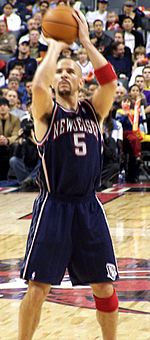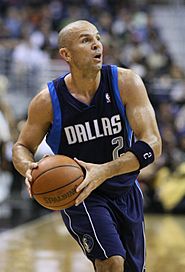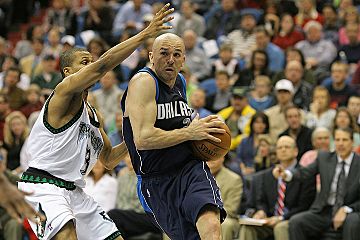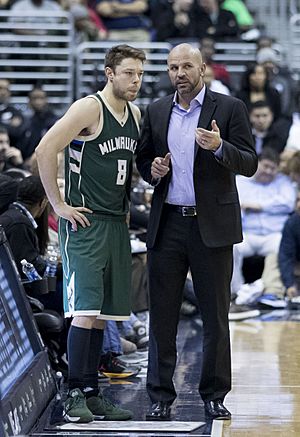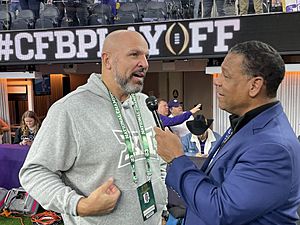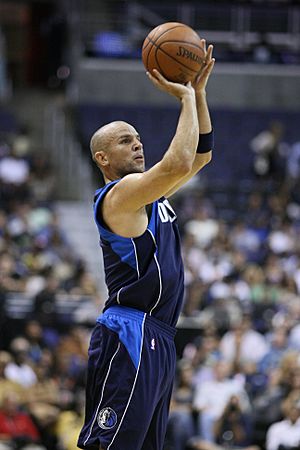Jason Kidd facts for kids
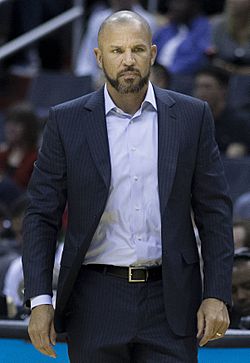
Kidd in 2014
|
|||||||||||||||||||||||||||||
| Dallas Mavericks | |||||||||||||||||||||||||||||
|---|---|---|---|---|---|---|---|---|---|---|---|---|---|---|---|---|---|---|---|---|---|---|---|---|---|---|---|---|---|
| Head coach | |||||||||||||||||||||||||||||
| Personal information | |||||||||||||||||||||||||||||
| Born | March 23, 1973 San Francisco, California, U.S. |
||||||||||||||||||||||||||||
| High school | St. Joseph Notre Dame (Alameda, California) | ||||||||||||||||||||||||||||
| Listed height | 6 ft 4 in (1.93 m) | ||||||||||||||||||||||||||||
| Listed weight | 210 lb (95 kg) | ||||||||||||||||||||||||||||
| Career information | |||||||||||||||||||||||||||||
| College | California (1992–1994) | ||||||||||||||||||||||||||||
| NBA Draft | 1994 / Round: 1 / Pick: 2nd overall | ||||||||||||||||||||||||||||
| Selected by the Dallas Mavericks | |||||||||||||||||||||||||||||
| Pro career | 1994–2013 | ||||||||||||||||||||||||||||
| Coaching career | 2013–present | ||||||||||||||||||||||||||||
| League | NBA | ||||||||||||||||||||||||||||
| Career history | |||||||||||||||||||||||||||||
| As player: | |||||||||||||||||||||||||||||
| 1994–1996 | Dallas Mavericks | ||||||||||||||||||||||||||||
| 1996–2001 | Phoenix Suns | ||||||||||||||||||||||||||||
| 2001–2008 | New Jersey Nets | ||||||||||||||||||||||||||||
| 2008–2012 | Dallas Mavericks | ||||||||||||||||||||||||||||
| 2012–2013 | New York Knicks | ||||||||||||||||||||||||||||
| As coach: | |||||||||||||||||||||||||||||
| 2013–2014 | Brooklyn Nets | ||||||||||||||||||||||||||||
| 2014–2018 | Milwaukee Bucks | ||||||||||||||||||||||||||||
| 2019–2021 | Los Angeles Lakers (assistant) | ||||||||||||||||||||||||||||
| 2021–present | Dallas Mavericks | ||||||||||||||||||||||||||||
| Career highlights and awards | |||||||||||||||||||||||||||||
As player:
As assistant coach:
|
|||||||||||||||||||||||||||||
| Career NBA statistics | |||||||||||||||||||||||||||||
| Points | 17,529 (12.6 ppg) | ||||||||||||||||||||||||||||
| Rebounds | 8,725 (6.3 rpg) | ||||||||||||||||||||||||||||
| Assists | 12,091 (8.7 apg) | ||||||||||||||||||||||||||||
|
Medals
|
|||||||||||||||||||||||||||||
Jason Frederick Kidd (born March 23, 1973) is an American professional basketball coach and former player. He is currently the head coach for the Dallas Mavericks in the National Basketball Association (NBA). Many people consider Kidd to be one of the best point guards ever.
As a player, Kidd was a 10-time NBA All-Star. He was also chosen for the All-NBA Team six times and the NBA All-Defensive Team nine times. He won an NBA championship in 2011 with the Dallas Mavericks. Kidd also won two gold medals in the Olympics with the U.S. national team in 2000 and 2008. In 2018, he was added to the Naismith Memorial Basketball Hall of Fame. In 2021, he was named to the NBA 75th Anniversary Team, honoring the league's greatest players.
Kidd played college basketball for the California Golden Bears. The Dallas Mavericks picked him second overall in the 1994 NBA draft. He was named co-NBA Rookie of the Year in his first season. After Dallas, Kidd played for the Phoenix Suns and then the New Jersey Nets. He led the Nets to two NBA Finals in 2002 and 2003. He returned to Dallas in 2008 and won his only NBA championship in 2011. Kidd finished his playing career in 2013 with the New York Knicks.
After retiring as a player, Kidd became a head coach. He coached the Nets, then the Milwaukee Bucks. He was an assistant coach for the Los Angeles Lakers, winning another NBA championship in 2020. In 2021, he became the head coach for the Dallas Mavericks. He led them to the Western Conference finals in his first season and the 2024 NBA Finals in his third season.
Kidd was known for his amazing passing and rebounding skills. He often achieved a triple-double (double-digits in points, rebounds, and assists). He ranks third all-time in the NBA for both career assists and career steals.
Contents
Early Life and High School Success
Jason Kidd was born in San Francisco and grew up in Oakland, California. His father was African-American, and his mother was Irish-American. As a young player, Kidd was very talented. He played for AAU teams and won many awards. He often played against future Hall of Famer Gary Payton on Oakland's city courts.
Kidd went to St. Joseph Notre Dame High School in Alameda, California. He led his high school team to two state championships. In his senior year, he averaged 25 points, 10 assists, 7 rebounds, and 7 steals per game. He won many individual awards, including the Naismith Prep Player of the Year Award as the best high school player in the nation. He was also named Player of the Year by PARADE and USA Today. Kidd became the all-time leader in assists for high school players in California. He was also a McDonald's All-American.
After high school, Kidd chose to attend the University of California, Berkeley. This was a surprise to many because the school's basketball team had not been very successful.
College Basketball Career
In his first year at the University of California, Kidd played exceptionally well. He averaged 13.0 points, 7.7 assists, 4.9 rebounds, and 3.8 steals per game. These numbers earned him the national Freshman of the Year award. He also made the All-Pac-10 team.
Kidd set new school records for steals (110) and assists (220) in a season. His excellent play helped the Golden Bears reach the NCAA Tournament. They even upset the two-time defending national champions, Duke, before losing to Kansas.
Kidd continued his success in his second year. He averaged 16.7 points, 6.9 rebounds, 3.1 steals, and 9.1 assists. He broke his own school record for assists in a season with 272. He also led the entire nation in assists that year. Kidd was chosen as a First Team All-American. He was also named Pac-10 Player of the Year, the first sophomore to receive this honor.
The Golden Bears returned to the NCAA Tournament but lost in the first round. Kidd was a finalist for the Naismith and Wooden Awards, which honor college basketball's top player. After his sophomore year, he decided to enter the 1994 NBA draft. In 2004, the University of California retired Kidd's number 5 jersey to honor him.
Professional Playing Career
Dallas Mavericks (1994–1996)
The Dallas Mavericks picked Jason Kidd as the second overall player in the 1994 NBA draft. In his first year, he averaged 11.7 points, 5.4 rebounds, and 7.7 assists. He led the NBA in triple-doubles. Kidd shared the NBA Rookie of the Year award with Grant Hill of the Detroit Pistons.
Before Kidd joined the Mavericks, they had the worst record in the NBA. After his first season, their record improved significantly. This was the biggest improvement in the NBA that year. In his second season, Kidd was voted to start in the 1996 All-Star Game. He was part of a group of young stars in Dallas known as the "Three J's." Kidd was traded during his third season with the team.
Phoenix Suns (1996–2001)
Kidd was traded to the Phoenix Suns during the 1996–97 season. In his first full season with the Suns in 1997–98, the team won 16 more games than the year before. The Suns were known for their fast-paced style of play, with Kidd often leading a small lineup of four guards.
In the 1998–99 season, Kidd led the league in assists with 10.8 per game. He also led the NBA with seven triple-doubles. He averaged career highs in points (16.9 ppg), rebounds (6.8 rpg), and steals (2.28 spg). He was one of the few players to rank in the top 50 in 10 different statistics. The Suns won all seven games where he had a triple-double.
The Suns added Penny Hardaway before the 1999–00 season. Their goal was to create the best backcourt in the league. Even with a good record, injuries to both Kidd and Hardaway affected the team's season. Kidd broke his ankle but returned for the playoffs. He helped his team beat the defending champion San Antonio Spurs.
During his time in Phoenix, Kidd was an All-Star three times (1998, 2000, and 2001). He led the NBA in assists for three years in a row (1999–2001). He was also chosen for the All-NBA First Team and NBA All-Defensive Team three times.
New Jersey Nets (2001–2008)
On June 28, 2001, Kidd was traded to the New Jersey Nets. He joined a young team with players like Kenyon Martin and rookies Richard Jefferson and Jason Collins. In the 2001–02 season, Kidd led the Nets to a 52–30 record. This was a huge improvement and the first time the franchise won 50 games in the NBA. He was chosen for the All-NBA First Team.
With Kidd leading them, the Nets did very well in the playoffs. They won the Eastern Conference title and reached the franchise's first-ever NBA Finals. They had exciting wins, including a double-overtime victory against the Indiana Pacers. Kidd scored 20 of his 31 points in the fourth quarter and overtimes in that game. After beating the Charlotte Hornets, they faced the Boston Celtics. Kidd averaged a triple-double for that series. In the NBA Finals, the Nets lost to the Shaquille O'Neal and Kobe Bryant's Los Angeles Lakers.
New Jersey had another great season in 2002–03, finishing 49–33 and reaching the NBA finals again. Kidd had his highest-scoring season with 18.7 points per game. He also led the league in assists with 8.9 per game. He was selected to the All-NBA Second Team. In the playoffs, the Nets went on a 10-game winning streak, sweeping the Celtics and the Detroit Pistons. In the Finals, New Jersey lost to Tim Duncan's San Antonio Spurs in six games.
In the 2003–04 season, Kidd averaged 15.5 points, 6.4 rebounds, and 9.2 assists, leading the league in assists for the second year in a row. The Nets finished 47–35, and Kidd was voted to the All-NBA First Team for the fifth time. In the playoffs, they lost to the Detroit Pistons in seven games.
Kidd recovered from a knee injury and returned for the 2004–05 season. The Nets acquired star player Vince Carter. Kidd and Carter helped the team make a late push to get into the playoffs. They were eliminated in the first round by the Miami Heat.
In the 2005–06 season, Kidd averaged 13.3 points, 7.3 rebounds, and 8.4 assists. He and Carter led the Nets to a third-place finish in the East. Kidd was named to the NBA All-Defensive First Team for the fourth time. In the playoffs, the Nets beat the Indiana Pacers but lost to the Miami Heat again.
Kidd was named an All-Star reserve in the 2006–07 season but missed the game due to a back injury. On April 7, 2007, Kidd and Carter became the first teammates since 1989 to record triple-doubles in the same game. In the playoffs, Kidd averaged a triple-double for the entire series against the Toronto Raptors. He became only the second player in NBA history to average a triple-double for an entire postseason. Despite his efforts, the Nets lost to the Cleveland Cavaliers.
In the 2007–08 season, Kidd achieved a triple-double in three straight games. He was voted by fans to start in the 2008 All-Star game. On February 19, 2008, Kidd was traded back to the Dallas Mavericks, the team that first drafted him.
Return to Dallas (2008–2012)
On February 19, 2008, Jason Kidd returned to the Dallas Mavericks in a trade. The Mavericks hoped Kidd would bring strong leadership to the team and help Dirk Nowitzki win an NBA championship. The Mavericks played well after the trade but lost in the first round of the 2008 NBA playoffs to the New Orleans Hornets.
In the 2008–09 season, Kidd helped the Mavericks finish strong and earn a playoff spot. He ranked third in the league in steals. In the playoffs, the Mavericks upset the San Antonio Spurs. Kidd led the team in assists in almost every game. Their season ended when they lost to the Denver Nuggets.
On July 5, 2009, Kidd decided to re-sign with the Mavericks for three years. In the 2009–10 season, the Mavericks finished second in their conference. However, they lost to the San Antonio Spurs in the first round of the 2010 NBA playoffs.
NBA Championship and Sportsmanship Award
Jason Kidd won the NBA championship with the Dallas Mavericks on June 12, 2011. They defeated the Miami Heat, which included stars like LeBron James and Dwyane Wade. After losing in two previous NBA Finals, this was Kidd's first and only championship as a player. The 2010–11 season was very successful for the Mavericks.
Kidd played a key role in the Mavericks' playoff run. He helped them beat the Portland Trail Blazers and then sweep the two-time defending champion Los Angeles Lakers. In the Western Conference finals against the Oklahoma City Thunder, Kidd helped guard young stars Kevin Durant and Russell Westbrook. Dallas won that series in five games. In the NBA Finals, the Mavericks defeated the Miami Heat in six games. Kidd helped defend Dwyane Wade and LeBron James. He averaged 9.3 points, 7.3 assists, 4.5 rebounds, and 1.9 steals during the championship run. At 38 years old, he became the oldest starting point guard to lead his team to a championship.
The 2011–12 season was Kidd's last with the Mavericks. The defending champions were swept by the Oklahoma City Thunder in the first round of the 2012 NBA playoffs. On May 3, 2012, Kidd won his first NBA Sportsmanship Award.
New York Knicks (2012–2013)
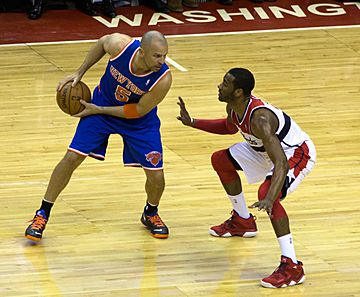
On July 12, 2012, Kidd signed with the New York Knicks. He was expected to help mentor younger players. The Knicks started the 2012–13 season with a strong record. New York finished the season with 54 wins, a big improvement from the previous year. This was their first 50-win season since 1999–2000.
The Knicks reached the second round of the playoffs but lost to the Indiana Pacers. Kidd retired on June 3, 2013, after one season with the Knicks and 19 seasons in the NBA.
Coaching Career
Brooklyn Nets (2013–2014)
On June 12, 2013, Jason Kidd was named the head coach of the Brooklyn Nets. He was the third person in NBA history to become a head coach the season after retiring as a player. In September 2013, Kidd bought a small ownership share in the team.
On October 17, 2013, the Nets honored Kidd by retiring his number 5 jersey. He made his coaching debut on November 3. On November 5, Kidd earned his first victory as a head coach against the Utah Jazz.
After a tough start to the season, the Nets improved greatly in 2014. They finished the season with a 44–38 record. Kidd started to receive recognition for his coaching skills. He was named the Eastern Conference Coach of the Month twice.
In the first round of the 2014 NBA playoffs, the Brooklyn Nets defeated the Toronto Raptors in a seven-game series. Kidd became the first rookie head coach to win a decisive Game 7 on the road. In the semifinals, the Nets lost to the Miami Heat.
Milwaukee Bucks (2014–2018)
On July 1, 2014, the Milwaukee Bucks acquired Kidd's coaching rights from the Brooklyn Nets. The Bucks were one of the biggest surprises of the 2014–15 season. Under Kidd's coaching, the young team improved significantly. They finished with a 41–41 record and made it to the playoffs. Kidd was the first coach in NBA history to lead two different teams to the playoffs in his first two years as a head coach. He finished third in voting for the NBA Coach of the Year Award.
The 2015–16 season was less successful for the Bucks, and they did not make the playoffs. However, Kidd made a key decision by moving young star Giannis Antetokounmpo to the point guard position. This helped Antetokounmpo develop into a top player.
The following season, Kidd led the Bucks to a winning record and their second playoff appearance in three years. Despite injuries to key players, the Bucks finished strong. In the first round of the playoffs, they lost to the Toronto Raptors. On January 22, 2018, the Bucks decided to make a change and fired Kidd.
Los Angeles Lakers (2019–2021)
On July 31, 2019, Kidd was hired as an assistant coach by the Los Angeles Lakers. Kidd won his second NBA championship when the Lakers defeated the Miami Heat in the 2020 NBA Finals. This was his first championship as a coach.
Dallas Mavericks (2021–present)
On June 28, 2021, Jason Kidd was hired as the head coach of the Dallas Mavericks. In the 2021–22 season, Kidd led the Mavericks to a 52–30 record. This was their highest win total in several years. Under Kidd, the Mavericks' defense improved greatly.
In his first season as head coach, Kidd led the Mavericks to their first two playoff series wins since their 2011 championship. They defeated the Utah Jazz and the Phoenix Suns, advancing to the Western Conference finals. The Mavericks' playoff run ended when they lost to the Golden State Warriors.
The 2022–23 season was not as successful, and the Mavericks did not make the playoffs. However, Kidd played a role in bringing Kyrie Irving to Dallas. On May 6, 2024, the Mavericks signed Kidd to a new contract. In 2024, Kidd led the Mavericks to their first NBA finals appearance since their 2011 championship. They won several playoff series before losing to the Boston Celtics in the Finals.
Career Milestones
- On April 16, 2008, Kidd recorded his 100th career triple-double.
- On March 2, 2009, Kidd became the fourth player in NBA history to reach 10,000 assists.
- On April 5, 2009, Kidd passed Magic Johnson for third place on the all-time assist list.
- On November 26, 2009, Kidd moved into second place on the all-time assists list, passing Mark Jackson.
- On November 12, 2010, Kidd made his 11,000th career assist.
- On January 12, 2011, Kidd passed Dale Ellis for third place on the NBA career three-pointers made list.
- On February 20, 2012, Kidd collected his 2,515th career steal, passing Michael Jordan for second all-time in steals. Only John Stockton has more.
- On February 8, 2013, Kidd broke the 12,000 career assist mark.
- In 2013, Kidd became the first player to win back-to-back NBA Sportsmanship Awards.
- He finished his career as the only player in NBA history with 17,500 points, 12,000 assists, 8,000 rebounds, and 2,500 steals.
National Team Career
Jason Kidd played for the U.S. national team multiple times. His first time was after his first college season. He was the only freshman chosen for the team.
Kidd later played in the 1999 USA Olympic Qualifying Tournament. The team won all 10 games and earned a spot in the 2000 Olympics. Kidd led the team in assists and steals.
In 2000, Kidd was one of the team captains for the 2000 Olympics in Sydney. The team won all 8 games and took home the gold medal. Kidd again led the team in assists and steals.
In 2003, Kidd played in the FIBA Americas Olympic Qualifying Tournament in Puerto Rico. The team won all 10 games, earning another gold medal and a spot in the 2004 Olympics.
In 2007, Kidd helped the team win another gold medal at the FIBA Americas Championship. This earned them a spot in the 2008 Olympics in Beijing. Kidd led the entire tournament in assist-to-turnover ratio.
In 2008, Kidd played in the 2008 Olympics. The team, known as the "Redeem Team", won every game and earned their first gold medal since 2000.
Overall, Kidd won five gold medals as a member of the U.S. national team.
Player Profile and Legacy
When Jason Kidd retired, he was second all-time in NBA history in both assists and steals, behind only John Stockton. He led the NBA in assists five times. His 107 career triple-doubles rank sixth all-time.
Kidd finished his career averaging 12.6 points, 8.7 assists, 6.3 rebounds, and 1.9 steals per game. He was known for his accurate passes and for helping his teammates score. Scoring points himself was not his main focus. Many consider him one of the best rebounding guards in NBA history.
Even though Kidd was not a great outside shooter when he started his career, he improved a lot. When he retired, he was third all-time in the NBA in three-point field goals made. He considered winning the NBA championship with Dallas and his two Olympic gold medals as the top highlights of his career.
In 2021, to celebrate the NBA's 75th Anniversary, The Athletic ranked Kidd as the 36th greatest player in NBA history.
Personal Life
Jason Kidd married Porschla Coleman on September 10, 2011.
On April 24, 2025, it was announced that Kidd had joined the ownership group of English Premier League club Everton.
Career statistics
| Legend | |||||
|---|---|---|---|---|---|
| GP | Games played | GS | Games started | MPG | Minutes per game |
| FG% | Field goal percentage | 3P% | 3-point field goal percentage | FT% | Free throw percentage |
| RPG | Rebounds per game | APG | Assists per game | SPG | Steals per game |
| BPG | Blocks per game | PPG | Points per game | Bold | Career high |
NBA
Regular season
| Year | Team | GP | GS | MPG | FG% | 3P% | FT% | RPG | APG | SPG | BPG | PPG |
|---|---|---|---|---|---|---|---|---|---|---|---|---|
| 1994–95 | Dallas | 79 | 79 | 33.8 | .385 | .272 | .698 | 5.4 | 7.7 | 1.9 | .3 | 11.7 |
| 1995–96 | Dallas | 81 | 81 | 37.5 | .381 | .336 | .692 | 6.8 | 9.7 | 2.2 | .3 | 16.6 |
| 1996–97 | Dallas | 22 | 22 | 36.0 | .369 | .323 | .667 | 4.1 | 9.1 | 2.0 | .4 | 9.9 |
| Phoenix | 33 | 23 | 35.5 | .423 | .400 | .688 | 4.8 | 9.0 | 2.4 | .4 | 11.6 | |
| 1997–98 | Phoenix | 82* | 82* | 38.0 | .416 | .313 | .799 | 6.2 | 9.1 | 2.0 | .3 | 11.6 |
| 1998–99 | Phoenix | 50* | 50* | 41.2 | .444 | .366 | .757 | 6.8 | 10.8* | 2.3 | .4 | 16.9 |
| 1999–00 | Phoenix | 67 | 67 | 39.0 | .409 | .337 | .829 | 7.2 | 10.1* | 2.0 | .4 | 14.3 |
| 2000–01 | Phoenix | 77 | 76 | 39.8 | .411 | .297 | .814 | 6.4 | 9.8* | 2.2 | .3 | 16.9 |
| 2001–02 | New Jersey | 82 | 82 | 37.3 | .391 | .321 | .814 | 7.3 | 9.9 | 2.1 | .2 | 14.7 |
| 2002–03 | New Jersey | 80 | 80 | 37.4 | .414 | .341 | .841 | 6.3 | 8.9* | 2.2 | .3 | 18.7 |
| 2003–04 | New Jersey | 67 | 66 | 36.6 | .384 | .321 | .827 | 6.4 | 9.2* | 1.8 | .2 | 15.5 |
| 2004–05 | New Jersey | 66 | 65 | 36.9 | .398 | .360 | .740 | 7.4 | 8.3 | 1.9 | .1 | 14.4 |
| 2005–06 | New Jersey | 80 | 80 | 37.2 | .404 | .352 | .795 | 7.3 | 8.4 | 1.9 | .4 | 13.3 |
| 2006–07 | New Jersey | 80 | 80 | 36.7 | .406 | .343 | .778 | 8.2 | 9.2 | 1.6 | .3 | 13.0 |
| 2007–08 | New Jersey | 51 | 51 | 37.2 | .366 | .356 | .820 | 8.1 | 10.4 | 1.5 | .3 | 11.3 |
| Dallas | 29 | 29 | 34.9 | .426 | .461 | .815 | 6.5 | 9.5 | 2.1 | .4 | 9.9 | |
| 2008–09 | Dallas | 81 | 81 | 35.6 | .416 | .406 | .819 | 6.2 | 8.7 | 2.0 | .5 | 9.0 |
| 2009–10 | Dallas | 80 | 80 | 36.0 | .423 | .425 | .808 | 5.6 | 9.1 | 1.8 | .4 | 10.3 |
| 2010–11† | Dallas | 80 | 80 | 33.2 | .361 | .340 | .870 | 4.4 | 8.2 | 1.7 | .4 | 7.9 |
| 2011–12 | Dallas | 48 | 48 | 28.7 | .363 | .354 | .786 | 4.1 | 5.5 | 1.7 | .2 | 6.2 |
| 2012–13 | New York | 76 | 48 | 26.9 | .372 | .351 | .833 | 4.3 | 3.3 | 1.6 | .3 | 6.0 |
| Career | 1,391 | 1,350 | 36.0 | .400 | .349 | .785 | 6.3 | 8.7 | 1.9 | .3 | 12.6 | |
| All-Star | 9 | 5 | 23.2 | .525 | .478 | .833 | 3.4 | 7.7 | 2.7 | .0 | 6.4 | |
Playoffs
| Year | Team | GP | GS | MPG | FG% | 3P% | FT% | RPG | APG | SPG | BPG | PPG |
|---|---|---|---|---|---|---|---|---|---|---|---|---|
| 1997 | Phoenix | 5 | 5 | 41.4 | .396 | .364 | .526 | 6.0 | 9.8 | 2.2 | .4 | 12.0 |
| 1998 | Phoenix | 4 | 4 | 42.8 | .379 | .000 | .813 | 5.8 | 7.8 | 4.0 | .5 | 14.3 |
| 1999 | Phoenix | 3 | 3 | 42.0 | .419 | .250 | .714 | 2.3 | 10.3 | 1.7 | .3 | 15.0 |
| 2000 | Phoenix | 6 | 6 | 38.2 | .400 | .364 | .778 | 6.7 | 8.8 | 1.8 | .2 | 9.8 |
| 2001 | Phoenix | 4 | 4 | 41.5 | .319 | .235 | .750 | 6.0 | 13.3 | 2.0 | .0 | 14.3 |
| 2002 | New Jersey | 20 | 20 | 40.2 | .415 | .189 | .808 | 8.2 | 9.1 | 1.7 | .4 | 19.6 |
| 2003 | New Jersey | 20 | 20 | 42.6 | .402 | .327 | .825 | 7.7 | 8.2 | 1.8 | .2 | 20.1 |
| 2004 | New Jersey | 11 | 11 | 43.1 | .333 | .208 | .811 | 6.6 | 9.0 | 2.3 | .5 | 12.6 |
| 2005 | New Jersey | 4 | 4 | 45.5 | .388 | .367 | .545 | 9.0 | 7.3 | 2.5 | .0 | 17.3 |
| 2006 | New Jersey | 11 | 11 | 40.9 | .371 | .300 | .826 | 7.6 | 9.6 | 1.5 | .2 | 12.0 |
| 2007 | New Jersey | 12 | 12 | 40.3 | .432 | .420 | .520 | 10.9 | 10.9 | 1.8 | .4 | 14.6 |
| 2008 | Dallas | 5 | 5 | 36.0 | .421 | .462 | .625 | 6.4 | 6.8 | 1.4 | .4 | 8.6 |
| 2009 | Dallas | 10 | 10 | 38.6 | .458 | .447 | .850 | 5.8 | 5.9 | 2.2 | .3 | 11.4 |
| 2010 | Dallas | 6 | 6 | 40.5 | .304 | .321 | .917 | 6.8 | 7.0 | 2.3 | .2 | 8.0 |
| 2011† | Dallas | 21 | 21 | 35.4 | .398 | .374 | .800 | 4.5 | 7.3 | 1.9 | .5 | 9.3 |
| 2012 | Dallas | 4 | 4 | 36.0 | .341 | .346 | .900 | 6.0 | 6.0 | 3.0 | .3 | 11.5 |
| 2013 | New York | 12 | 0 | 20.6 | .120 | .176 | 1.000 | 3.5 | 2.0 | 1.0 | .3 | .9 |
| Career | 158 | 146 | 38.5 | .391 | .322 | .781 | 6.7 | 8.0 | 1.9 | .3 | 12.9 | |
College
| Year | Team | GP | GS | MPG | FG% | 3P% | FT% | RPG | APG | SPG | BPG | PPG |
|---|---|---|---|---|---|---|---|---|---|---|---|---|
| 1992–93 | California | 29 | 28 | 31.8 | .463 | .286 | .657 | 4.9 | 7.7* | 3.8* | .3 | 13.0 |
| 1993–94 | California | 30 | 29 | 35.1 | .472 | .362 | .692 | 6.9 | 9.1* | 3.1* | .3 | 16.7 |
| Career | 59 | 57 | 33.5 | .468 | .333 | .677 | 5.9 | 8.4 | 3.5 | .3 | 14.9 | |
Head coaching record
| Regular season | G | Games coached | W | Games won | L | Games lost | W–L % | Win–loss % |
| Playoffs | PG | Playoff games | PW | Playoff wins | PL | Playoff losses | PW–L % | Playoff win–loss % |
| Team | Year | G | W | L | W–L% | Finish | PG | PW | PL | PW–L% | Result |
|---|---|---|---|---|---|---|---|---|---|---|---|
| Brooklyn | 2013–14 | 82 | 44 | 38 | .537 | 2nd in Atlantic | 12 | 5 | 7 | .417 | Lost in conference semifinals |
| Milwaukee | 2014–15 | 82 | 41 | 41 | .500 | 3rd in Central | 6 | 2 | 4 | .333 | Lost in first round |
| Milwaukee | 2015–16 | 82 | 33 | 49 | .402 | 5th in Central | — | — | — | — | Missed playoffs |
| Milwaukee | 2016–17 | 82 | 42 | 40 | .512 | 2nd in Central | 6 | 2 | 4 | .333 | Lost in first round |
| Milwaukee | 2017–18 | 45 | 23 | 22 | .511 | (fired) | — | — | — | — | — |
| Dallas | 2021–22 | 82 | 52 | 30 | .634 | 2nd in Southwest | 18 | 9 | 9 | .500 | Lost in conference finals |
| Dallas | 2022–23 | 82 | 38 | 44 | .463 | 3rd in Southwest | — | — | — | — | Missed playoffs |
| Dallas | 2023–24 | 82 | 50 | 32 | .610 | 1st in Southwest | 22 | 13 | 9 | .591 | Lost in NBA Finals |
| Dallas | 2024–25 | 82 | 39 | 43 | .476 | 3rd in Southwest | — | — | — | — | Missed playoffs |
| Career | 701 | 362 | 339 | .516 | 64 | 31 | 33 | .484 | |||
See also
 In Spanish: Jason Kidd para niños
In Spanish: Jason Kidd para niños
- List of NBA franchise career scoring leaders
- List of NBA career assists leaders
- List of NBA career steals leaders
- List of NBA career turnovers leaders
- List of NBA career 3-point scoring leaders
- List of NBA career games played leaders
- List of NBA career minutes played leaders
- List of NBA career triple-double leaders
- List of NBA career playoff assists leaders
- List of NBA career playoff steals leaders
- List of NBA career playoff triple-double leaders
- List of NBA career playoff turnovers leaders
- List of NBA career playoff 3-point scoring leaders
- List of NBA single-game assists leaders
- List of NBA seasons played leaders
- List of oldest and youngest NBA players


